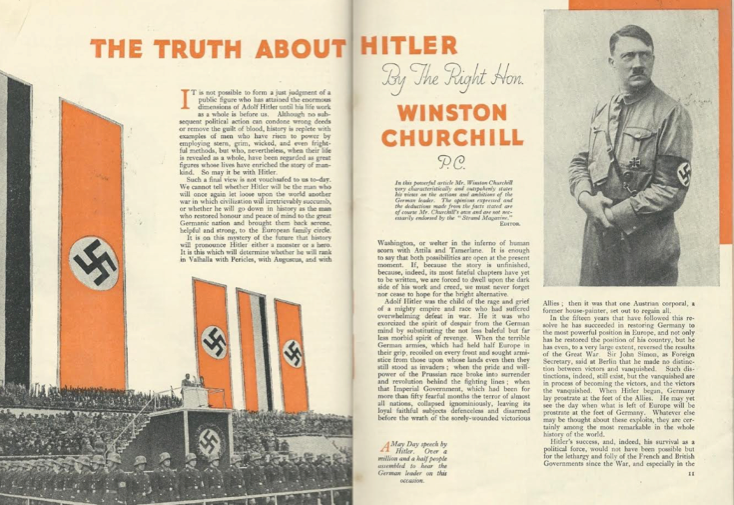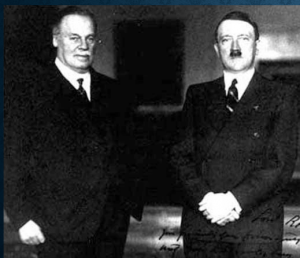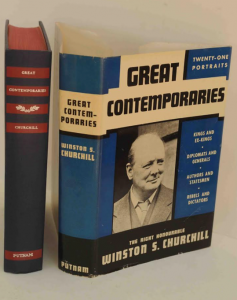
Nashville (5). The Myth that Churchill Admired Hitler
Part 5 of Winston Churchill, Myth and Reality examines multiplying fables between the two World Wars. Churchill was an alcoholic, we are often assured. He flip-flopped over Bolshevism. All Jews were communists, he said. He despised Gandhi. A closet fascist, he supported Mussolini. But one tall tale perhaps eclipses all the others. It is the idea that Churchill admired Hitler. Remarks to the Churchill Society of Tennessee, Nashville, 14 October 2017. Continued from Part 4…
Judging Hitler

It is important to understand just how right Churchill was about Hitler. In May 1935 the Führer wrote a revealing letter to the British newspaper magnate Esmond Harmsworth, Lord Rothermere, one of his promoters. Hitler declared he was for Anglo-German understanding. He’d worked for it for fifteen years. Their mutual enemy was Bolshevism.
An Anglo-German alliance, Hitler wrote, would combine “the unique colonial ability and sea-power of England” with “one of the greatest soldier-races of the world.” Together, Britain and Germany could ensure generations of peace—a brotherhood of man. Except for references to Aryan supremacy, the Pope might have been writing this screed.
Rothermere enthusiastically forwarded the Hitler note to Churchill—whose reply was definitive. If Hitler was suggesting Britain agree to Germany dominating the continent, Churchill replied, it would be counter to history. Britain had always been on the side of Europe’s second strongest power: “Thus Elizabeth resisted Philip II of Spain. Thus William III and Marlborough resisted Louis XIV. Thus Pitt resisted Napoleon, and thus we all resisted William II of Germany.”
* * *
In 1935, Churchill published an article on Hitler, later reprinted in part in his 1937 book Great Contemporaries. Out of courtesy to the government (courtesy existed among politicians in those days), Churchill submitted his draft to the Foreign Office. They thought it too harsh. Churchill toned it down. They still didn’t like it. (“Don’t Let’s be Beastly to the Germans,” as Noël Coward later sang.)
In his 1935 article, WSC wrote: “…history will pronounce Hitler either a monster or a hero…whether he will rank in Valhalla with Pericles, with Augustus and with Washington, or welter in the inferno of human scorn with Attila and Tamerlane.”
These words were removed from his Great Contemporaries essay, though they reappeared shortly after the book was published in “This Age of Government by Great Dictators (News of the World, 10 October 1937. None of his words materially alters Churchill’s view of the Führer.
“A Champion as Indomitable…”

Ah, replied Pat Buchanan, but what about this: “If our country were defeated, I hope we should find a champion as indomitable to restore our courage and lead us back to our place among the nations.”
Without context, “a champion as indomitable” almost seems like a testimonial. But Churchill had preceded that by saying: “One may dislike Hitler’s system and yet admire his patriotic achievement.” And Buchanan leaves out the rest:
I am sorry, however, that he has not been mellowed by the great success that has attended him. Everyone would rejoice to see in Hitler acts of magnanimity and of mercy and of pity to the forlorn and friendless, to the weak and poor….let this great man search his own heart and conscience before he accuses anyone of being a warmonger.
Churchill insisted he was no enemy of Germany. But he said what he thought the people should hear. So he declared that Britain would reject the “brutal intolerances of Nazidom” and “the paganism on which they are based.”
As a politician, Churchill obviously appreciated Hitler’s skill and nerve. With his innate optimism, he hoped briefly that Hitler might mellow. But in his fundamental understanding, Churchill never wavered. He was right all along. Dead right.
World War II: Firebombing Dresden
Next: World War II is the largest source of myths. An actor delivered his broadcasts. Churchill opposed the Second Front in France. He exacerbated the Bengal famine and destroyed Monte Cassino abbey. He refused to bomb Auschwitz or to feed the oppressed in occupied Europe. Well, no. But no World War II canard is more persistent than the story that Churchill firebombed Dresden in hatred and revenge for the bombing of Coventry. Continued in Part 6…






